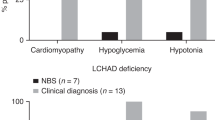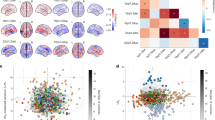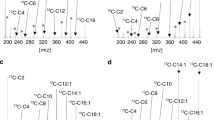Abstract
Carnitine palmitoyltransferase (CPT) II deficiency is one of the most common forms of mitochondrial fatty acid oxidation disorder. Its clinical phenotypes are classified into the muscle, severe infantile, and lethal neonatal forms. Among Caucasians, the muscle form predominates, and the c.338C > T (p.S113L) variant is detected in most cases, whereas among the Japanese, c.1148T > A (p.F383Y) is the variant allele occurring with the highest frequency and can apparently cause symptoms of the severe infantile form. Newborn screening (NBS) for this potentially fatal disease has not been established. We encountered an infantile case of CPT II deficiency not detected in NBS using C16 and C18:1 concentrations as indices, and therefore we adopted the (C16 + C18:1)/C2 ratio as an alternative primary index. As a result, the disease was diagnosed in nine of 31 NBS-positive subjects. The values for (C16 + C18:1)/C2 in the affected newborns partly overlapped with those in unaffected ones. Among several other indices proposed previously, C14/C3 has emerged as a more promising index. Based on these findings, nationwide NBS for CPT II deficiency using both (C16 + C18:1)/C2 and C14/C3 as indices was officially approved and started in April 2018. We diagnosed the disease in four young children presenting with symptoms of the muscle form, whose values for the new indices were not elevated. Although it is still difficult to detect all cases of the muscle form of CPT II deficiency in NBS, our system is expected to save many affected children in Japan with the severe infantile form predominating.
Similar content being viewed by others
Log in or create a free account to read this content
Gain free access to this article, as well as selected content from this journal and more on nature.com
or
References
Fritz IB, Yue KT. Long-chain carnitine acyltransferase and the role of acylcarnitine derivatives in the catalytic increase of fatty acid oxidation induced by carnitine. J Lipid Res. 1963;4:279–88.
Yates DW, Garland PB. Carnitine palmitoyltransferase activities (EC 2.3.1.-) of rat liver mitochondria. Biochem J. 1970;119:547–52.
Finocchiaro G, Taroni F, Rocchi M, Liras Martin A, Colombo I, Torri Tarelli G, et al. cDNA cloning, sequence analysis, and chomosomal localization of the gene for human carnitine palmitoyltransferase. Proc Natl Acad Sci USA. 1991;88:661–5.
Gellera C, Verderio E, Floridia G, Finocchiaro G, Montermini L, Cavadini P, et al. Assignment of the human carnitine palmitoyltransferase II gene to chromosome lp32. Genomics. 1994;24:195–7.
Britton CH, Mackey DW, Esser V, Foster DW, Burns DK, Yarnall DP, et al. Fine chromosome mapping of the genes for human liver and muscle carnitine palmitoyltransferase I (CPT1A and CPT1B). Genomics. 1997;40:209–11.
Yamazaki N, Shinohara Y, Shima A, Yamanaka Y, Terada H. Isolation and characterization of cDNA and genomic clones encoding human muscle type carnitine palmitoyltransferase I. Biochim Biophys Acta. 1996;1307:157–61.
Price NT, van der Leij FR, Jackson VN, Corstorphine CG, Thomson R, Sorensen A, et al. A novel brain-expressed protein related to carnitine palmitoyltransferase 1. Genomics. 2002;80:433–42.
Di Mauro S, Di Mauro PM. Muscle carnitine palmitoyltransferase deficiency and myoglobinuria. Science. 1973;182:929–31.
Demaugre F, Bonnefont JP, Colonna M, Cepanec C, Leroux JP, Saudubray JM. Infantile form of carnitine palmitoyltransferase II deficiency with hepatomuscular symptoms and sudden death. Physiopathological approach to carnitine palmitoyltransferase II deficiencies. J Clin Invest. 1991;87:859–64.
Hug G, Bove KE, Soukup S. Lethal neonatal multiorgan deficiency of carnitine palmitoyltransferase II. N Engl J Med. 1991;325:1862–4.
Joshi PR, g M, Zierz S. Carnitine palmitoyltransferase II (CPT II) deficiency: genotype–phenotype analysis of 50 patients. J Neurol Sci. 2014;338:107–11.
Taroni F, Verderio E, Dworzak F, Willems PJ, Cavadini P, DiDonato S. Identification of common mutation in the carnitine palmitoyltransferase II gene in familial recurrent myoglobinuria patients. Nat Genet. 1993;4:314–20.
Zierz S, Engel AG, Olek K. The Ser113Leu mutation in the carnitine palmitoyltransferase II gene in patients with muscle carnitine palmitoyltransferase deficiency. Muscle Nerve. 1994;19:S129.
Kaufmann P, El-Schahawi M, DiMauro S. Carnitine palmitoyltransferase II deficiency: diagnosis by molecular analysis of blood. Mol Cell Biochem. 1997;174:237–9.
Bonnefont JP, Demaugre F, Prip-Buus C, Saudubray JM, Brivet M, Abadi N. Carnitine palmitoyltransferase deficiencies. Mol Genet Metab. 1999;68:424–40.
Taggart RT, Smail D, Apolito C, Vladutiu GD. Novel mutations associated with carnitine palmitoyltransferase II deficiency. Hum Mutat. 1999;13:210–20.
Wieser T, Deschauer M, Olek K, Hermann T, Zierz S. Carnitine palmitoyltransferase II deficiency: molecular and biochemical analysis of 32 patients. Neurology. 2003;60:1351–3.
Deschauer M, Wieser T, Zierz S. Muscle carnitine palmitoyltransferase II deficiency: clinical and molecular genetic features and diagnostic aspects. Arch Neurol. 2005;62:37–41.
Isackson PJ, Bennett MJ, Vladutiu GD. Identification of 16 new disease-causing mutations in the CPT2 gene resulting in carnitine palmitoyltransferase II deficiency. Mol Genet Metab. 2006;89:323–31.
Corti S, Bordoni A, Ronchi D, Musumeci O, Aguennouz M, Toscano A, et al. Clinical features and new molecular findings in carnitine palmitoyltransferase II (CPT II) deficiency. J Neurol Sci. 2008;266:97–103.
Fanin M, Anichini A, Cassandrini D, Fiorillo C, Scapolan S, Minetti C, et al. Allelic and phenotypic heterogeneity in 49 Italian patients with the muscle form of CPT-II deficiency. Clin Genet. 2012;82:232–9.
Lehmann D, Zierz S. Normal protein content but abnormally inhibited enzyme activity in muscle carnitine palmitoyltransferase II deficiency. J Neurol Sci. 2014;339:183–8.
Hurvitz H, Klar A, Korn-Lubetzki I, Wanders RJA, Elpeleg ON. Muscular carnitine palmitoyltransferase II deficiency in infancy. Pediatr Neurol. 2000;22:148–50.
Gempel K, von Praun C, Baumkotter J, Lehnert W, Ensenauer R, Gerbitz KD, et al. “Adult” form of muscular carnitine palmitoyltransferase II deficiency: manifestation in a 2-year-old child. Eur J Pediatr. 2001;160:548–51.
Deschauer M, Wieser T, Schröder R, Zierz S. A novel nonsense mutation (515del4) in muscle carnitine palmitoyltransferase II deficiency. Mol Genet Metab. 2002;75:181–5.
Thuillier L, Sevin C, Demaugre F, Brivet M, Rabier D, Droin V, et al. Genotype/phenotype correlation in carnitine palmitoyltransferase II deficiency: lessons from a compound heterozygous patient. Neuromusc Disord. 2000;10:200–5.
Rafay MF, Murphy EG, McGarry JD, Kaufmann P, DiMauro S, Tein I. Clinical and biochemical heterogeneity in an Italian family with CPT II deficiency due to Ser 113 Leu mutation. Can J Neurol Sci. 2005;32:316–20.
Joshi PR, Deschauer M, Zierz S. Clinically symptomatic heterozygous carnitine palmitoyltransferase II (CPT II) deficiency. Wien Klin Wochenschr. 2012;124:851–4.
Olpin SE, Afifi A, Clark S, Manning NJ, Bonham JR, Dalton A, et al. Mutation and biochemical analysis in carnitine palmitoyltransferase type II (CPT II) deficiency. J Inherit Metab Dis. 2003;26:543–57.
Bonnefont JP, Djouadi F, Prip-Buus C, Gobin S, Munnich A, Bastin J. Carnitine palmitoyltransferases 1 and 2: biochemical, molecular and medical aspects. Mol Asp Med. 2004;25:495–520.
Vladutiu GD, Quackenbush EJ, Hainline BE, Albers S, Smail DS, Bennett MJ. Lethal neonatal and severe late infantile forms of carnitine palmitoyltransferase II deficiency associated with compound heterozygosity for different protein truncation mutations. J Pediatr. 2002;141:734–6.
Thuillier L, Rostane H, Droin V, Demaugre F, Brivet M, Kadhom N, et al. Correlation between genotype, metabolic data, and clinical presentation in carnitine palmitoyltransferase 2 (CPT2) deficiency. Hum Mutat. 2003;21:493–501.
Spiegel R, Shaag A, Gutman A, Korman SH, Saada A, Elpeleg O, et al. Severe infantile type of carnitine palmitoyltransferase II (CPT II) deficiency due to homozygous R503C mutation. J Inherit Metab Dis. 2007;30:266.
Isackson PJ, Bennett MJ, Lichter-Konecki UL, Willis M, Nyhan WL, Sutton VR, et al. CPT2 gene mutations resulting in lethal neonatal or severe infantile carnitine palmitoyltransferase II deficiency. Mol Genet Metab. 2008;94:422–7.
Yahyaoui R, Espinosa MG, Gómez C, Dayaldasani A, Rueda I, Roldán A, et al. Neonatal carnitine palmitoyltransferase II deficiency associated with Dandy–Walker syndrome and sudden death. Mol Genet Metab. 2011;104:414–6.
Shima A, Yasuno T, Yamada K, Yamaguchi M, Kohno R, Yamaguchi S, et al. First Japanese case of carnitine palmitoyltransferase II deficiency with the homozygous point mutation S113L. Intern Med. 2016;55:2659–61.
Wataya K, Akanuma J, Cavadini P, Aoki Y, Kure S, Invernizzi F, et al. Two CPT2 mutations in three Japanese patients with carnitine palmitoyltransferase II deficiency: functional analysis and association with polymorphic haplotypes and two clinical phenotypes. Hum Mutat. 1998;11:377–86.
Kaneoka H, Uesugi N, Moriguchi A, Hirose S, Takayanagi M, Yamaguchi S, et al. Carnitine palmitoyltransferase II deficiency due to a novel gene variant in a patient with rhabdomyolysis and ARF. Am J Kidney Dis. 2005;45:596–602.
Aoki J, Yasuno T, Sugie H, Kido H, Nishino I, Shigematsu Y, et al. A Japanese adult form of CPT II deficiency associated with a homozygous F383Y mutation. Neurology. 2007;69:804–6.
Yasuno T, Kaneoka H, Tokuyasu T, Aoki J, Yoshida S, Takayanagi M, et al. Mutations of carnitine palmitoyltransferase II (CPT II) in Japanese patients with CPT II deficiency. Clin Genet. 2008;73:496–501.
Yamamoto T, Tanaka H, Kobayashi H, Okamura K, Tanaka T, Emoto Y, et al. Retrospective review of Japanese sudden unexpected death in infancy: the importance of metabolic autopsy and expanded newborn screening. Mol Genet Metab. 2011;102:399–406.
Kobayashi Y, Ishikawa N, Tsumura M, Fujii Y, Okada S, Shigematsu Y, et al. Acute severe encephalopathy related to human herpesvirus-6 infection in a patient with carnitine palmitoyltransferase 2 deficiency carrying thermolabile variants. Brain Dev. 2013;35:449–53.
Yamada K, Bo R, Kobayashi H, Hasegawa Y, Ago M, Fukuda S, et al. A newborn case with carnitine palmitoyltransferase II deficiency initially judged as unaffected by acylcarnitine analysis soon after birth. Mol Genet Metab Rep. 2017;11:59–61.
Tajima G, Hara K, Tsumura M, Kagawa R, Okada S, Sakura N, et al. Newborn screening for carnitine palmitoyltransferase II deficiency using (C16+C18:1)/C2: evaluation of additional indices for adequate sensitivity and lower false-positivity. Mol Genet Metab. 2017;122:67–75.
Ikeda N, Maruyama S, Nakano K, Imakiire R, Ninomiya Y, Seki S, et al. A surviving 24-month-old patient with neonatal-onset carnitine palmitoyltransferase II deficiency. Mol Genet Metab Rep. 2017;11:69–71.
Taroni F, Verderio E, Fiorucci S, Cavadini P, Finocchiaro G, Uziel G, et al. Molecular characterization of inherited carnitine palmitoyltransferase II deficiency. Proc Natl Acad Sci USA. 1992;89:8429–33.
Chen Y, Mizuguchi H, Yao D, Ide M, Kuroda Y, Shigematsu Y, et al. Thermolabile phenotype of carnitine palmitoyltransferase II variations as a predisposing factor for influenza-associated encephalopathy. FEBS Lett. 2005;579:2040–4.
Yao D, Mizuguchi H, Yamaguchi M, Yamada H, Chida J, Shikata K, et al. Thermal instability of compound variants of carnitine palmitoyltransferase II and impaired mitochondrial fuel utilization in influenza-associated encephalopathy. Hum Mutat. 2008;29:718–27.
Kubota M, Chida J, Hoshino H, Ozawa H, Koide A, Kashii H, et al. Thermolabile CPT II variants and low blood ATP levels are closely related to severity of acute encephalopathy in Japanese children. Brain Dev. 2012;34:20–27.
Yao M, Cai M, Yao D, Xu X, Yang R, Li Y, et al. Abbreviated half-lives and impaired fuel utilization in carnitine palmitoyltransferase II variant fibroblasts. PLoS ONE. 2015;10:e0119936.
Bennett MJ, Rinaldo P, Strauss AW. Inborn errors of mitochondrial fatty acid oxidation. Crit Rev Clin Lab Sci. 2000;37:1–44.
Watson MS, Mann MY, Lloyd-Puryear MA, Rinaldo P, Howell RR. Executive summary. Genet Med. 2006;8:1S–11S.
Loeber JG, Burgard P, Cornel MC, Rigter T, Weinreich SS, Rupp K, et al. Newborn screening programmes in Europe: arguments and efforts regarding harmonization. Part 1—from blood spot to screening result. J Inherit Metab Dis. 2012;35:603–11.
Edmondson AC, Salant J, Ierardi-Curto LA, Ficicioglu C. Missed newborn screening case of carnitine palmitoyltransferase-II deficiency. JIMD Rep. 2017;33:93–97.
Tamaoki Y, Kimura M, Hasegawa Y, Iga M, Inoue M, Yamaguchi S. A survey of Japanese patients with mitochondrial fatty acid β-oxidation and related disorders as detected from 1985 to 2000. Brain Dev. 2002;24:675–82.
Gempel K, Kiechl S, Hofmann S, Lochmuller H, Kiechl-Kohlendorfer U, Willeit J, et al. Screening for carnitine palmitoyltransferase II deficiency by tandem mass spectrometry. J Inherit Metab Dis. 2002;25:17–27.
Verderio E, Cavadini P, Montermini L, Wang H, Lamantea E, Finocchiaro G, et al. Carnitine palmitoyltransferase II deficiency: structure of the gene and characterisation of two novel disease-causing mutations. Hum Mol Genet. 1995;4:19–29.
Yamamoto S, Abe H, Kongo T, Ogawa A, Ohtake A, Hayashibe H, et al. Two novel gene mutations (glu174-lys, phe383-tyr) causing the hepatic form of carnitine palmitoyltransferase II deficiency. Hum Genet. 1996;98:116–8.
Bonnefont JP, Taroni F, Cavadini P, Cepanec C, Brivet M, Saudubray JM, et al. Molecular analysis of carnitine palmitoyltransferase II deficiency with hepatocardiomuscular expression. Am J Hum Genet. 1996;58:971–8.
Acknowledgements
The authors thank Dr. Miyuki Tsumura, Dr. Reiko Kagawa, and Dr. Satoshi Okada (Department of Pediatrics, Hiroshima University Graduate School of Biomedical & Health Sciences) for helping with the genetic analysis, Dr. Nobuo Sakura (Nursing House for Severe Motor and Intellectual Severities, Suzugamine) for assistance with the enzymatic assay, Dr. Ikue Hata and Dr. Yosuke Shigematsu (Department of Pediatrics, School of Medical Sciences, University of Fukui) for assistance with the acylcarnitine analysis and the measurement of fatty acid oxidation capability, and Dr. Seiji Yamaguchi (Department of Pediatrics, Faculty of Medicine, Shimane University) for managing the pilot study on tandem mass spectrometry-based newborn screening in Japan. The authors also thank Ms. Chiyoko Yoshii, Ms. Chiyomi Morioka, and Ms. Saki Fujihara (Hiroshima City Medical Association Clinical Laboratory) for analyzing the dried blood specimens of newborns in Hiroshima prefecture. This study was supported in part by the Health and Labour Sciences Research Grants for (1) Health Research on Children, Youth and Families (Chief Investigator: Go Tajima) and (2) the Research on Rare and Intractable Diseases (Chief Investigator: Kimitoshi Nakamura), by the Practical Research Project for Rare/Intractable Diseases from the Japan Agency for Medical Research and Development, AMED, Grant Number JP18ek0109276 (Chief Investigator: Toshiyuki Fukao), by a Grant-in-Aid for Young Scientists, No. 18K15663, from the Japan Society for the Promotion of Science (Chief Investigator: Miori Yuasa), and by a grant from The Morinaga Hoshi-Kai Foundation. This study was carried out in part at the Analysis Center of Life Science, Hiroshima University, the Institute for Clinical Research at the National Hospital Organization Kure Medical Center and Chugoku Cancer Center.
Funding
Go Tajima received Health and Labour Sciences Research Grants (Health Research on Children, Youth and Families; Chief Investigator: Go Tajima, and Research on Rare and Intractable Diseases; Chief Investigator: Kimitoshi Nakamura) from the Ministry of Health, Labour and Welfare of Japan, and a Practical Research Project for Rare/Intractable Diseases Grant from the Japan Agency for Medical Research and Development, AMED (Grant number JP18ek0109276; Chief Investigator: Toshiyuki Fukao), and a grant from The Morinaga Hoshi-Kai Foundation. Miori Yuasa received a Grant-in-Aid for Young Scientists, No. 18K15663 from the Japan Society for the Promotion of Science. Keiichi Hara did not receive any funding for this study.
Author contributions
Go Tajima developed the assay of CPT II activity, carried out the enzymatic assays for all cases in this study, managed the entire project, and wrote this paper. Keiichi Hara performed the analysis of the CPT2 and CACT genes. Miori Yuasa analyzed the acylcarnitine profiles and measured fatty acid oxidation capability using tandem mass spectrometry.
Author information
Authors and Affiliations
Corresponding author
Ethics declarations
Conflict of interest
The authors declare that they have no conflict of interest.
Ethics approval
Approval for the biochemical, enzymatic, and genetic studies was obtained from the ethics committees of the National Center for Child Health and Development, Hiroshima University, University of Fukui, National Hospital Organization Kure Medical Center and Chugoku Cancer Center. All procedures were carried out in accordance with the ethical standards of the relevant committees on human experimentation (institutional and national) and the Helsinki Declaration of 1975 as revised in 2000.
Informed consent
Informed consent was obtained from all families enrolled in the study.
The guarantor for the article
Go Tajima.
Rights and permissions
About this article
Cite this article
Tajima, G., Hara, K. & Yuasa, M. Carnitine palmitoyltransferase II deficiency with a focus on newborn screening. J Hum Genet 64, 87–98 (2019). https://doi.org/10.1038/s10038-018-0530-z
Received:
Revised:
Accepted:
Published:
Issue date:
DOI: https://doi.org/10.1038/s10038-018-0530-z
This article is cited by
-
Carnitine Palmitoyl Transferase Deficiency in a University Immunology Practice
Current Rheumatology Reports (2020)



